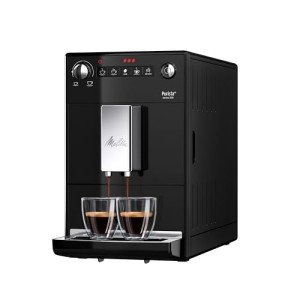Home Use Espresso Machines: A Comprehensive Guide
Espresso machines have actually ended up being a staple in many homes as coffee enthusiasts seek to duplicate café-quality brews in the convenience of their cooking areas. The rise in popularity has led to a varied market filled with numerous models, functions, and prices. Buy Coffee Machine intends to supply an informative summary of home use espresso machines, helping readers navigate their options efficiently.
Understanding Espresso Machines
Espresso machines work by forcing hot water through finely-ground coffee under high pressure, resulting in a focused coffee beverage called espresso. There are numerous types of espresso machines classified based on their developing techniques and level of automation. The most common types include:
- Manual Espresso Machines: These require the user to control the pressure and water flow, permitting a more hands-on coffee-making experience.
- Semi-Automatic Espresso Machines: These provide automatic control over water pressure, while the user manually grinds and tamps the coffee.
- Automatic Espresso Machines: With the push of a button, these machines automatically control the circulation of water, making it simpler to brew espresso with constant results.
- Super-Automatic Espresso Machines: These all-in-one machines deal with grinding, tampering, developing, and even milk frothing, making them perfect for users searching for convenience.
- Pill or Pod Machines: These use pre-packaged coffee pods to develop espresso with minimal effort, but they restrict option in developing strategies and tastes.
Table: Comparison of Espresso Machine Types
| Type | Control Level | Ease of Use | Cleaning Level | Ideal For |
|---|---|---|---|---|
| Manual | User-controlled | Moderate | High | Coffee purists |
| Semi-Automatic | Partial automation | Moderate | Moderate | Home baristas |
| Automatic | Completely automated | Easy | Low | Hectic individuals |
| Super-Automatic | Fully automated | Very easy | Very low | Convenience seekers |
| Capsule/Pod | Fully automated | Really easy | Really low | Casual drinkers |
Secret Features to Consider
When picking a home use espresso machine, it's vital to consider different functions that can substantially impact the quality of espresso and user experience.
- Pressure: Look for machines that offer at least 9 bars of pressure, as this is considered optimal for brewing espresso.
- Boiler Systems: Single vs. dual boiler systems figure out temperature level stability and the capability to brew espresso and steam milk all at once.
- Grinder: Integrated grinders enable newly ground coffee, which enhances taste. Consider machines with adjustable grind settings.
- Milk Frother: For those who enjoy cappuccinos and lattes, an integrated steam wand or automatic frother is important.
- Size and Design: Consider your kitchen area space and aesthetic preferences. Machines come in various sizes, from compact to large setups.
- Rate: Home espresso machines can range from a few hundred to numerous thousand dollars, so it's important to develop a budget before exploring alternatives.
Benefits and drawbacks of Home Use Espresso Machines
| Pros | Cons |
|---|---|
| Convenience of brewing coffee at home | Preliminary financial investment can be high |
| Quality of espresso is frequently superior | Needs some skill, especially with manual machines |
| Capability to try out tastes | Maintenance and cleaning can be labor-intensive |
| Can save cash in the long run | Not all machines will fit every coffee choice |
Upkeep and Cleaning Tips
Preserving an espresso machine is vital for lengthening its life and making sure constant brew quality. Here are some helpful pointers:
- Regular Descaling: Minerals from water can develop in the machine. Descale every 1-3 months, depending on water hardness.
- Daily Cleaning: Rinse portafilters, baskets, and steam wands after each use to avoid coffee oils from developing residue.
- Use Filtered Water: This can help lower mineral accumulation and enhance the taste of coffee.
- Replace Gaskets and Seals: These parts may wear out with time and ought to be changed to maintain pressure and efficiency.
- Check out the Manual: Each machine has specific care instructions; following these will ensure durability.
FAQs About Home Use Espresso Machines
Q1: What is the best budget espresso machine?The best budget espresso machine often depends upon specific requirements, but designs like the DeLonghi EC155 or the Breville Bambino are popular amongst users for offering fantastic worth. Espresso Machines Under £100 : How long do home espresso machines normally last?With appropriate upkeep, home espresso machines can last anywhere from 5 to 15 years, depending upon the quality of the machine and frequency of use. Espresso Machines Under £1000 : Can I make cappuccinos and lattes with any espresso machine?While most espresso machines can make cappuccinos and lattes, having a reputable
steam wand or frother is necessary for accomplishing the best milk texture.
Q4: Are super-automatic machines worth the investment?For those who prioritize benefit and fast brewing, super-automatic machines can be worth the financial investment, though they may do not have some customizability in brew strength and flavor. Q5: What types of coffee beans are best for espresso?While individual preference plays a function, beans identified as" espresso "blends are normally roasted darker, developing abundant flavors and a creamy texture when brewed.
Investing in a home espresso machine can transform the day-to-day coffee routine into something unique, elevating home brews to café quality. By comprehending the different kinds of machines, key features to consider, maintenance requirements, and weighing the
advantages and disadvantages, consumers can make educated choices that suit their individual preferences. As the espresso culture continues to grow, no matter the choice, every brew can be a tasty experience waiting to be relished.

